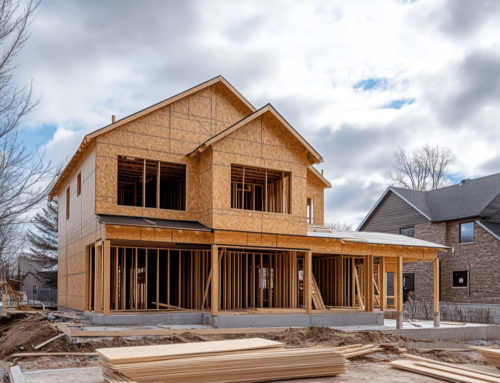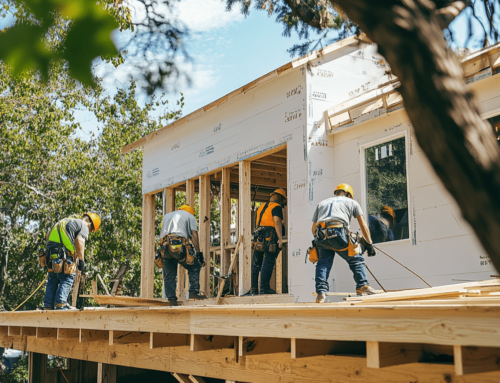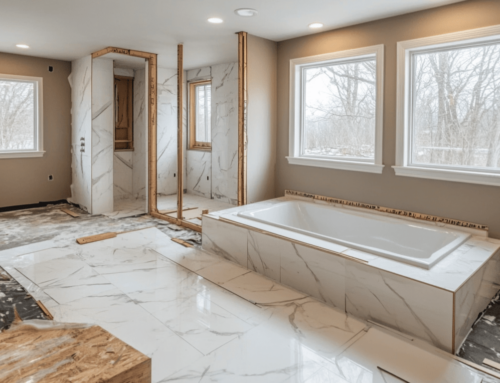Disclaimer: The information in this article is intended for research purposes only and not as legal tax advice. Do not base any financial decision on the information included without consulting a licensed tax professional first.
Taxes in the United States can be complicated — especially when you own a home. The IRS allows homeowners to deduct some homeownership-related costs from their incomes for tax purposes. For many other expenses, homeowners are on their own.
Given the expense of many home improvement projects, you may be curious about whether or not you can deduct those costs from your taxes. The answer is — as with most things related to taxes in this country — it’s complicated.
To help you navigate your tax return and save money where you can, we created this guide to tax-deductible home improvement projects. We go over the types of projects you can deduct from your taxes, and which ones you can’t, according to current regulations.
Can You Deduct Home Improvement Costs From Your Taxes?
The simple answer is yes, you can deduct some home improvement expenses from your taxes. But whether or not an upgrade or renovation is eligible is complicated.
Attempting to deduct ineligible improvements could land you in trouble with the IRS, leaving you open to fines and other punishments. You should always consult a professional when it comes to tax questions to ensure you’re in compliance with the law. However, it can be helpful to get an idea for what types of projects you can deduct when making home improvement plans.
Which Home Improvement Projects Are Tax Deductible?
Whether or not the money you spend working on your home can be deducted depends on more than the project itself. There are a few types of improvements that are almost always deductible. Most, however, are subject to other factors related to your home and how you use it.
In the following sections, we’ll cover the categories of deductible projects and the criteria that impact tax eligibility.
Clean Energy Upgrades
Under the Residential Clean Energy Credit system, the federal government offers tax incentives for homeowners who invest in certain clean energy technologies for their homes. This credit is limited to $500 per kilowatt-hour when it comes to fuel cell technology. But for everything else, there are no limitations on what you can deduct.
These investments can be a sound financial move in more ways than one. Not only can investing in alternative energy net you some tax savings, it can also lower your utility bills. That’s in addition to the reduction in your home’s carbon footprint.
Example Projects
Some of the clean energy upgrades that may be tax eligible include installing:
- Solar panels
- Solar water heaters
- Geothermal heat pumps

Energy Efficiency Upgrades
The federal government allows homeowners to deduct some of the expense of making their homes more energy efficient under the Energy Efficiency Home Improvement Credit. In 2024, homeowners are permitted to deduct up to 30% of the cost of new energy-efficient appliances and certain eligible services.
Example Projects
You may be able to deduct a portion of the cost of making some energy-efficiency improvements to your home, such as:
- Upgrading to Energy STAR-certified appliances, like water heaters, stoves, and laundry machines
- Getting a home energy audit from an approved contractor
- Replacing older windows with Energy STAR-certified windows (up to $600 credit)
- Installing Energy STAR-certified skylights (up to $600 credit)
Improvements to Rental Properties
Generally speaking, businesses have a much wider range of expenses they can deduct from their taxes than individual homeowners. Because of this, there are many repairs and improvement projects you can deduct when you make them to rental properties you own that you can’t for your own home. Depending on how it is structured, this may also apply if you rent out a portion of the home where you reside, too.
It’s important to note that these expenses can only be deducted from your business earnings for that specific property. You cannot take the deduction on your personal income tax. Due to the complexity of small business taxes, it is imperative that you seek guidance from a tax professional.
Example Projects
Rental property owners may be able to deduct improvement expenses related to keeping their properties in good condition and in compliance with local regulations. These can include:
- Repairing utility infrastructure like plumbing, HVAC, and electrical systems
- Making structural repairs to damaged homes
- Improvements to a property’s energy efficiency, such as installing better windows and sealing doors and windows
- Repairing leaks to plumbing and fixtures
In some cases, you may be able to deduct the costs of upgrades to a property that increase its rental value. However, these questions are ones for your accountant.
Home Office Improvements
If you run a business from your home, many improvements to your home office space can be tax deductible. This is because your office is an essential part of your business, just as if you were paying to rent an office off site. That means there are many projects you can deduct from your business’ income than you could if it were strictly residential.
Eligibility can be a little tricky. The IRS will only allow you to deduct costs directly related to your business. If your improvements are limited to only your home office, they can likely be deducted. But if they extend to other areas of your home, you may not be able to deduct the entire cost — or any of it.
Like with rental properties, you must deduct these expenses from your business’ income. You cannot deduct them from your personal income directly.
Example Projects
Some of the home office improvements you can deduct from your taxes include:
- Infrastructure improvements like network upgrades
- Installing a security system
- Installing energy-efficient windows
Upgrades to Historic Homes
The Rehabilitation Tax Credit is designed to help owners of historic homes preserve those homes. This can help prevent homes from falling into disrepair and needing to be torn down.
You can use these credits to upgrade aging infrastructure in an historic home. Upgrading things like wiring and plumbing can add modern conveniences to older homes while preserving their character.
Example Projects
Some of the things you can deduct under the Rehabilitation Tax Credit include:
- Replacing older electrical wiring with modern wiring
- Removing older plumbing lines, especially those with lead in them, and installing new ones
- Replacing deteriorating structural parts of the home, such as walls, stairs, and the roof
Medically-Necessary Improvements
If the home improvement project you want to take on is related to a health need for someone who lives there, you can often deduct its cost. That is because the IRS offers deductions for medical expenses. Projects that make your home more accessible typically fall under this category.
Example Projects
Some of the projects that may qualify for a medical expense deduction include:
- Installing a wheelchair ramp
- Adding grab bars to showers and other bathroom fixtures
- Grading and leveling land to make it easier for those with mobility issues to move around
It’s important to note that the impact medically-necessary improvements have on your home’s value factors into how much you can deduct. If an upgrade adds value to your home, you can only deduct the cost of the upgrade minus the increase in value.
Capital Improvements
Another category of tax-deductible improvements are those that you make that increase the value of your investment in your home. However, these are not expenses that you can deduct immediately in most cases. You cannot deduct these costs from your personal income tax.
The cost of these projects can only be deducted if you decide to sell your home at that time. You can deduct them from your capital gains tax — or, the tax you pay on the money you make from selling you home.
Deducting Home Improvement Costs From Your Taxes
As you can see, there are quite a few home improvement projects that can qualify as tax deductible expenses. But what should also be clear is how nuanced the regulations are around these projects.
This article can help give you a good idea of which projects you may be able to use tax credits to lower the cost of. That information can help you form your home improvement plan. However, to avoid legal trouble and penalties, make sure you confirm everything with a qualified accountant.





